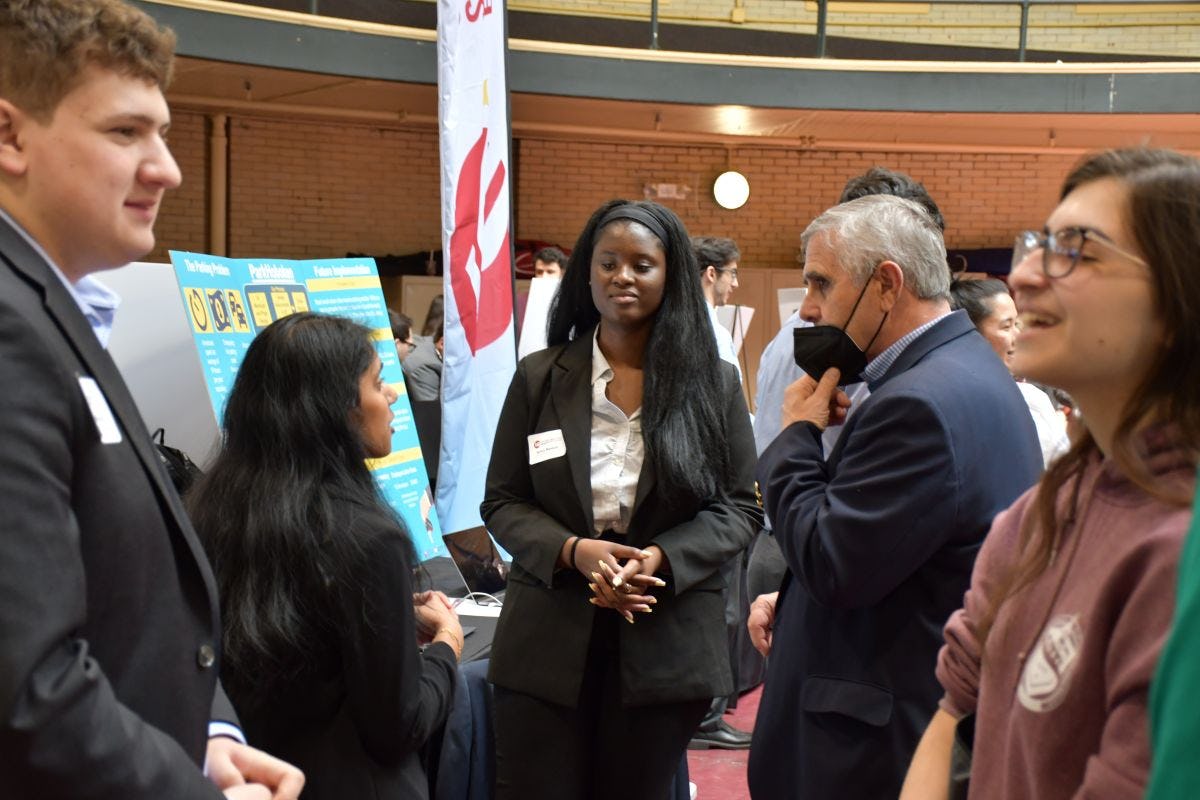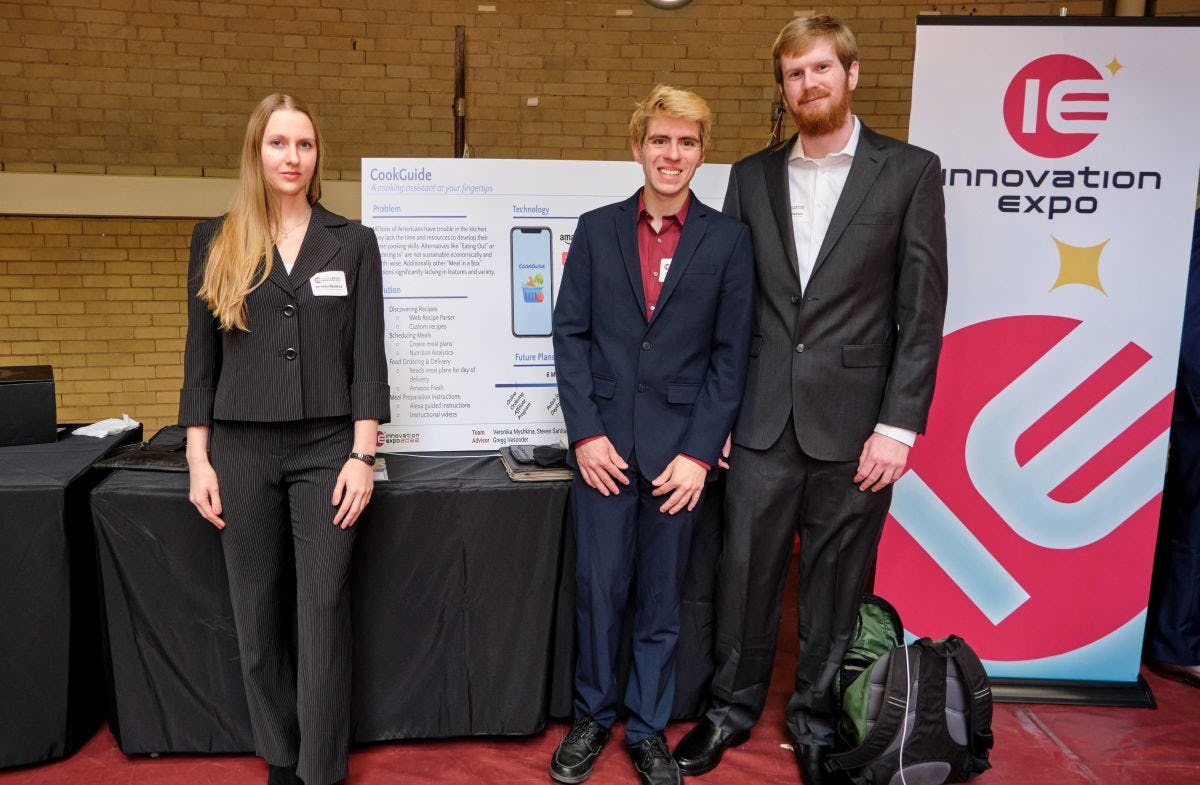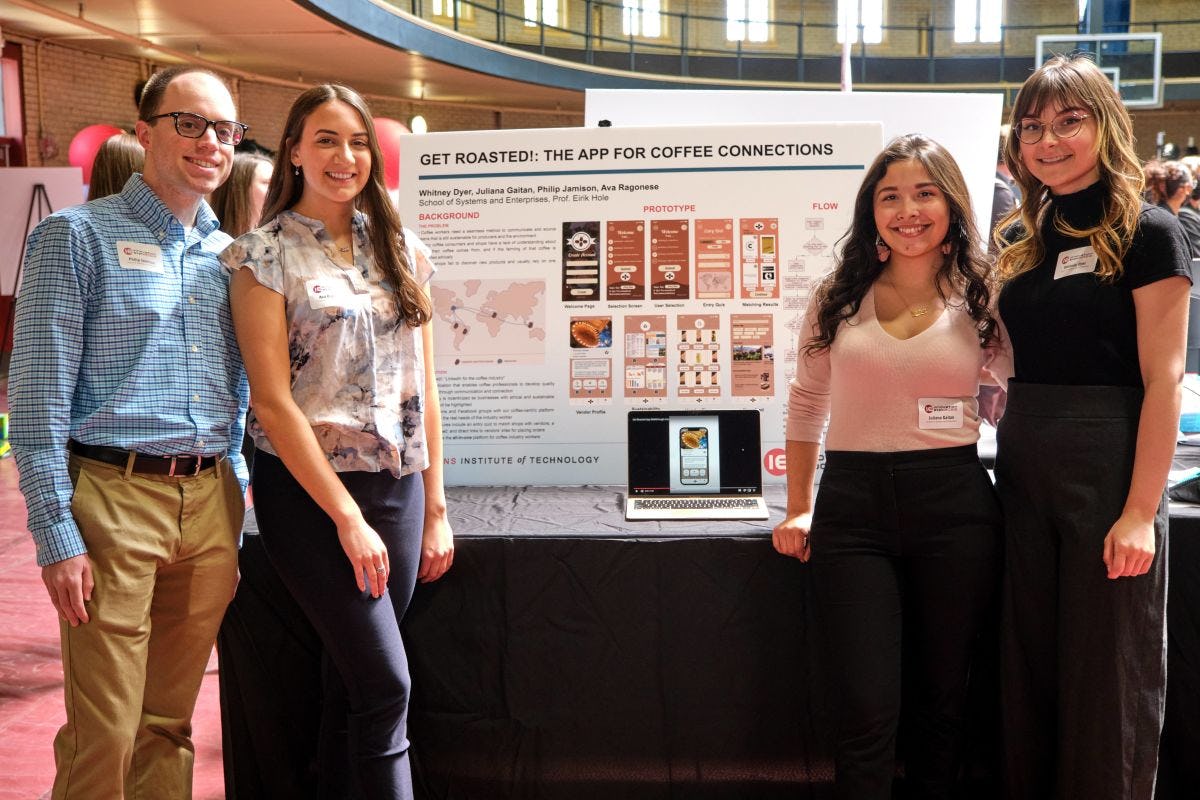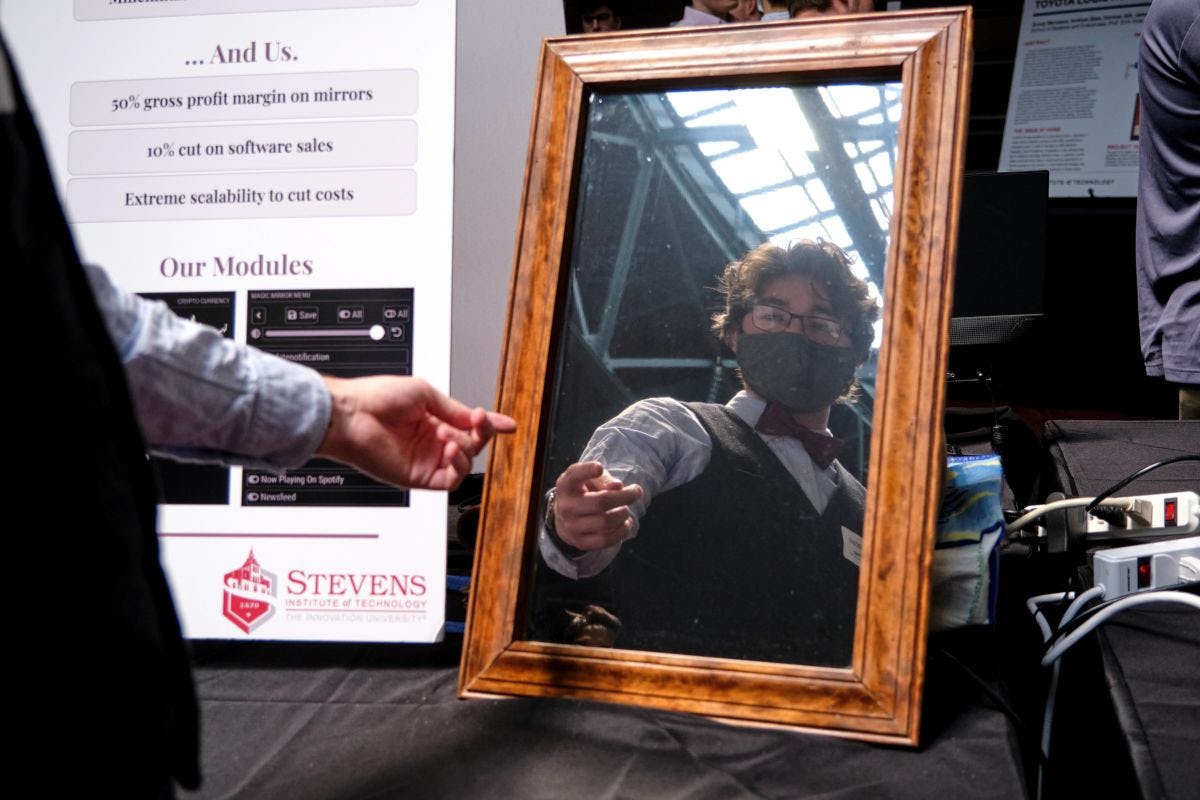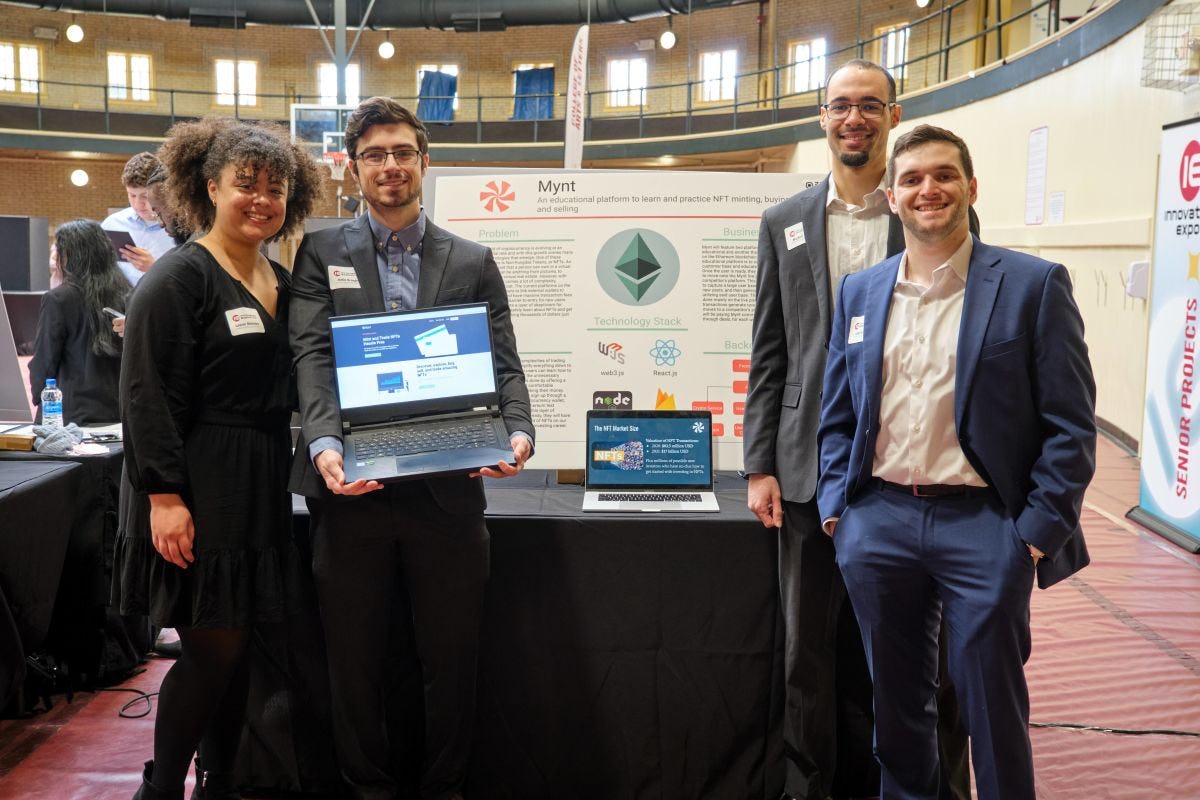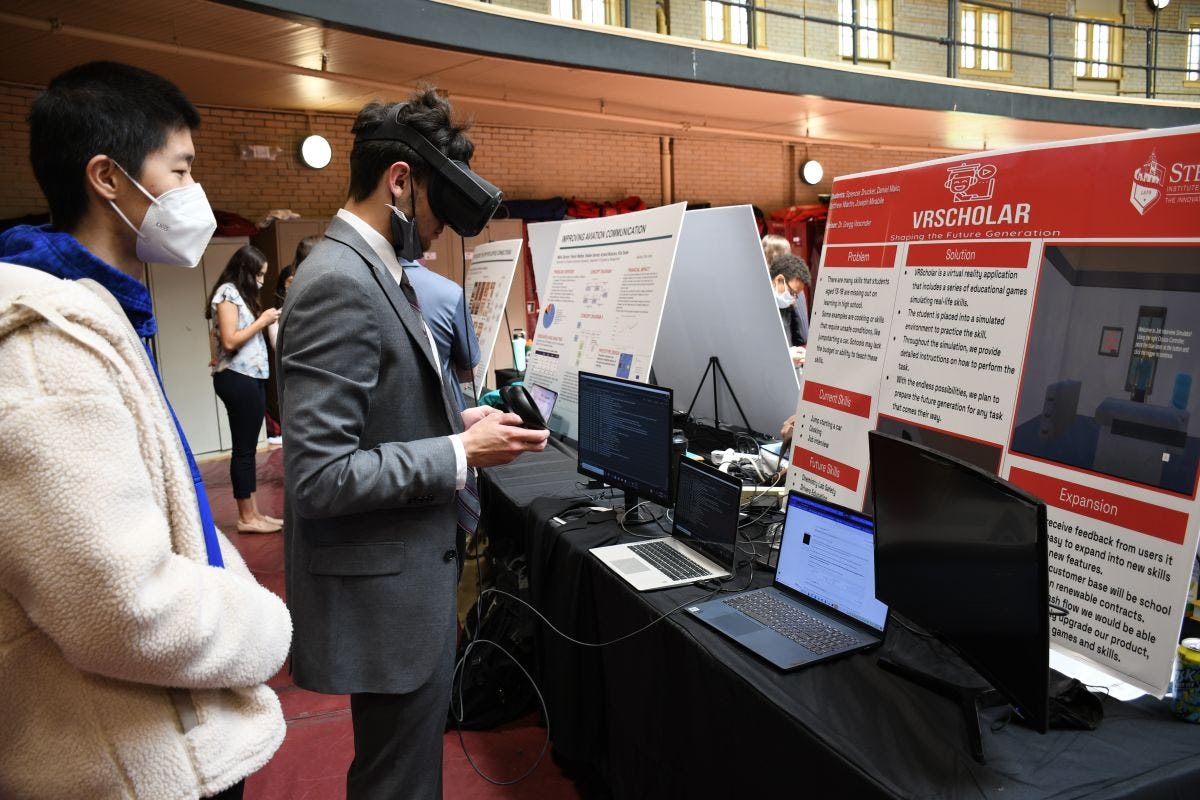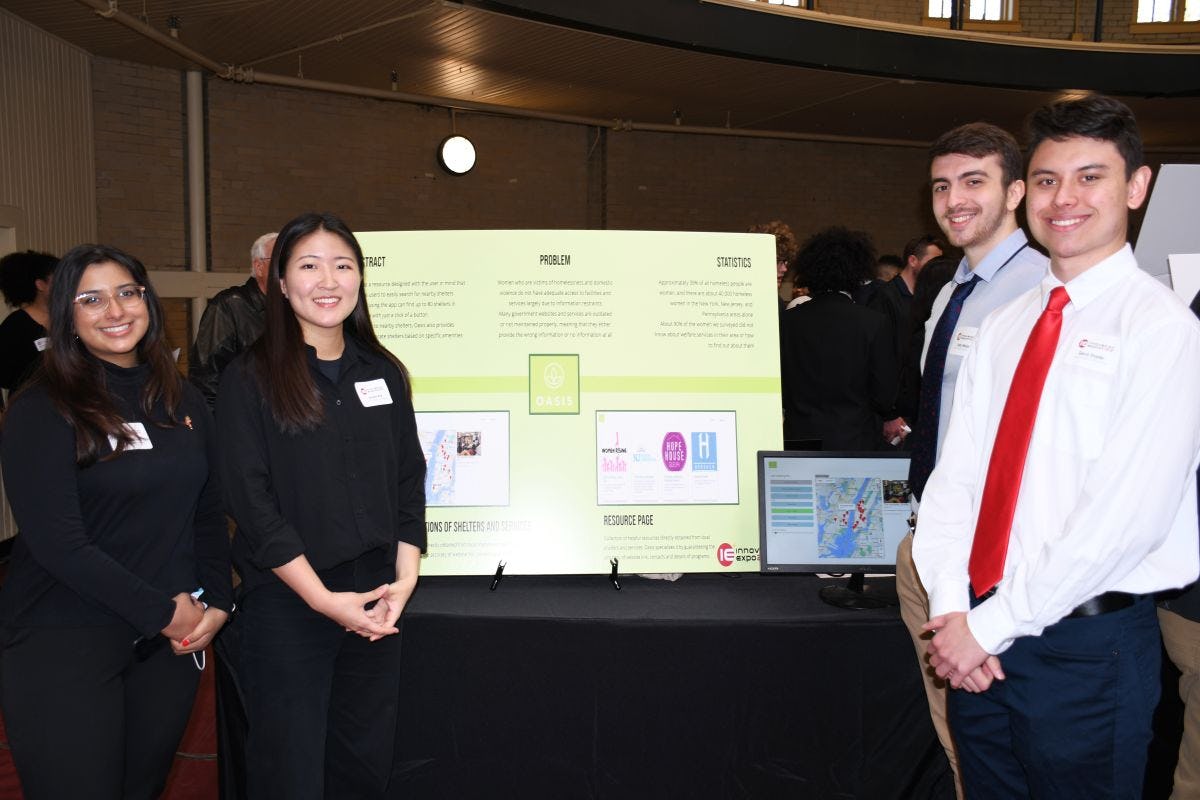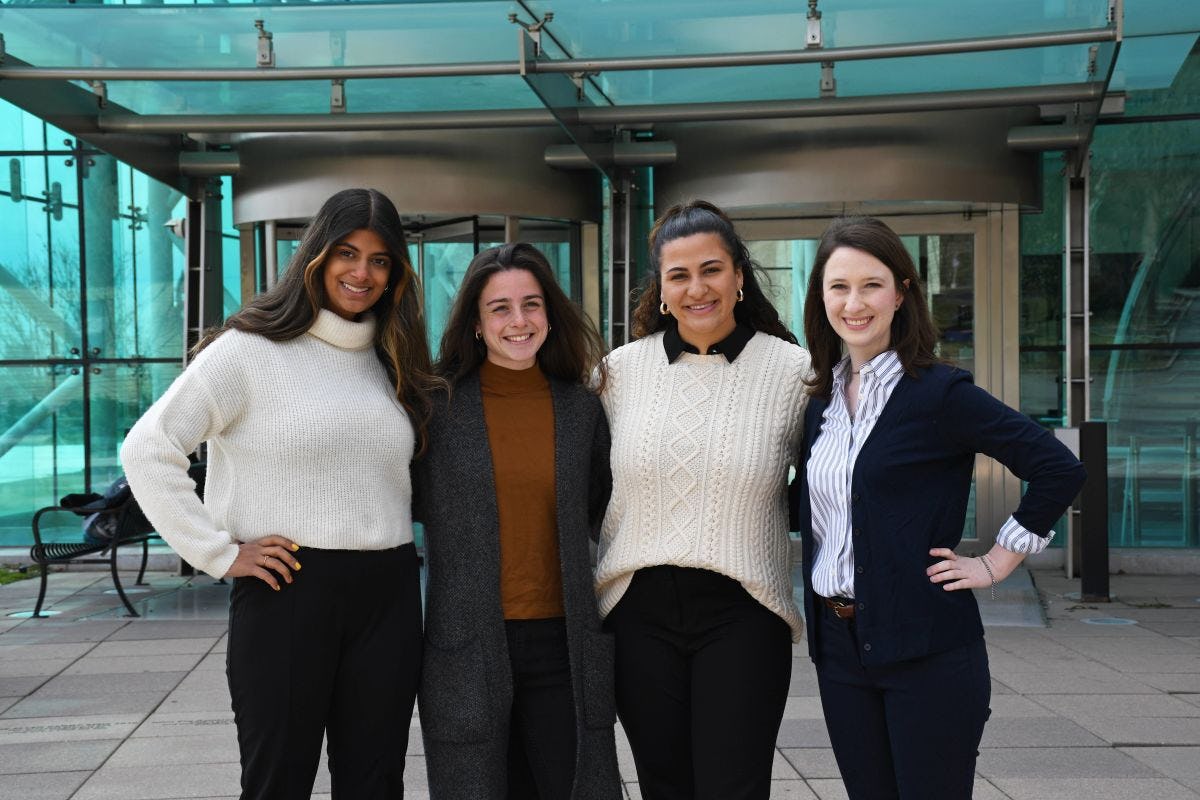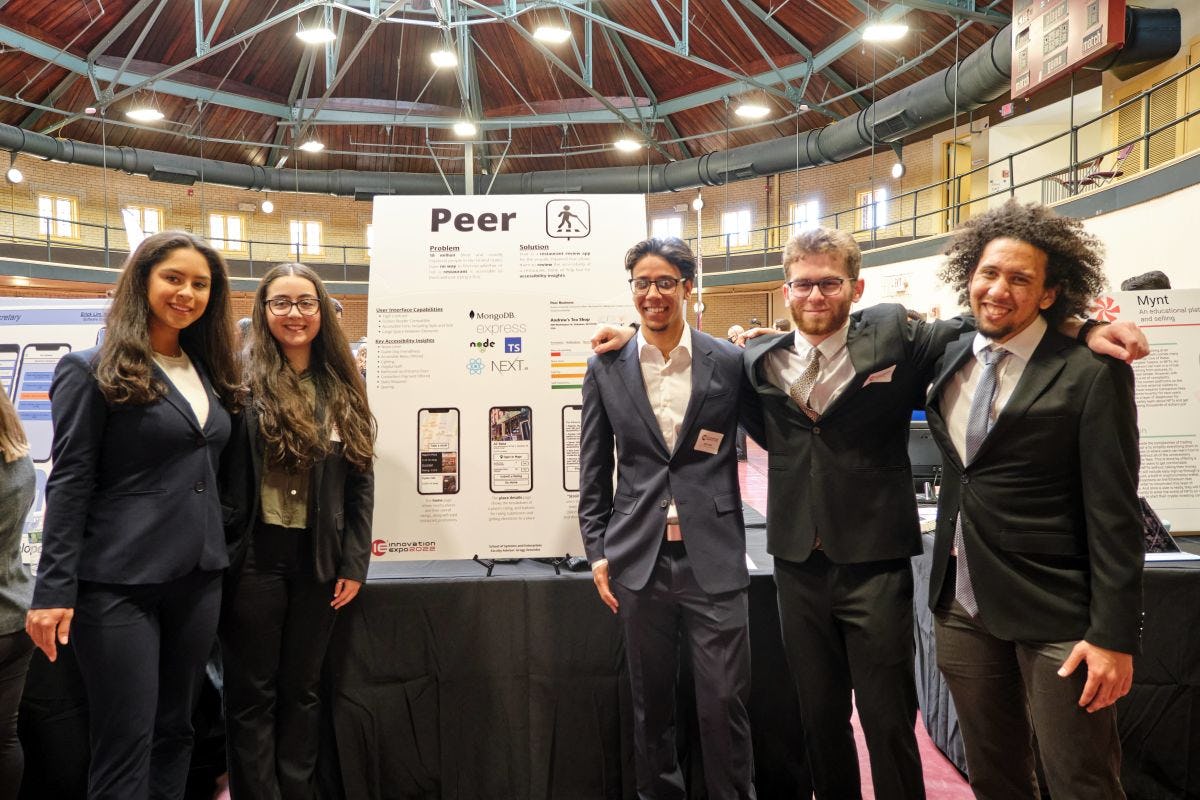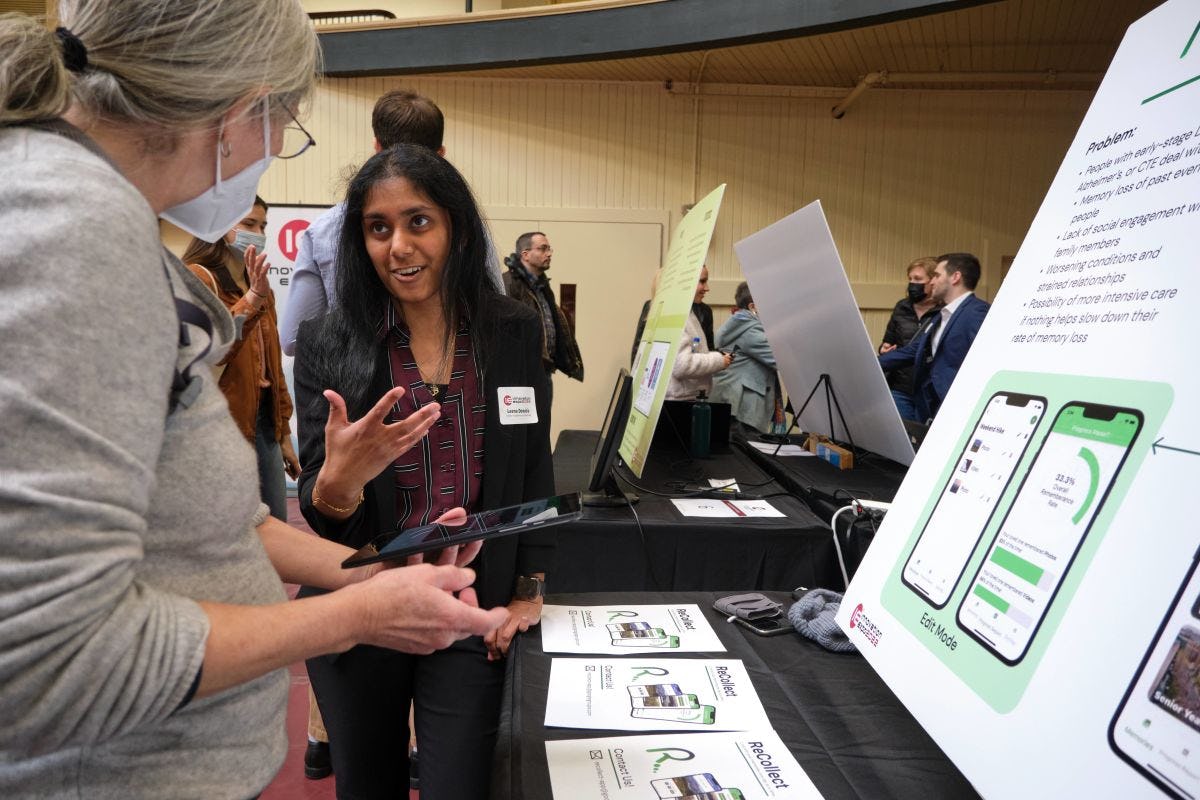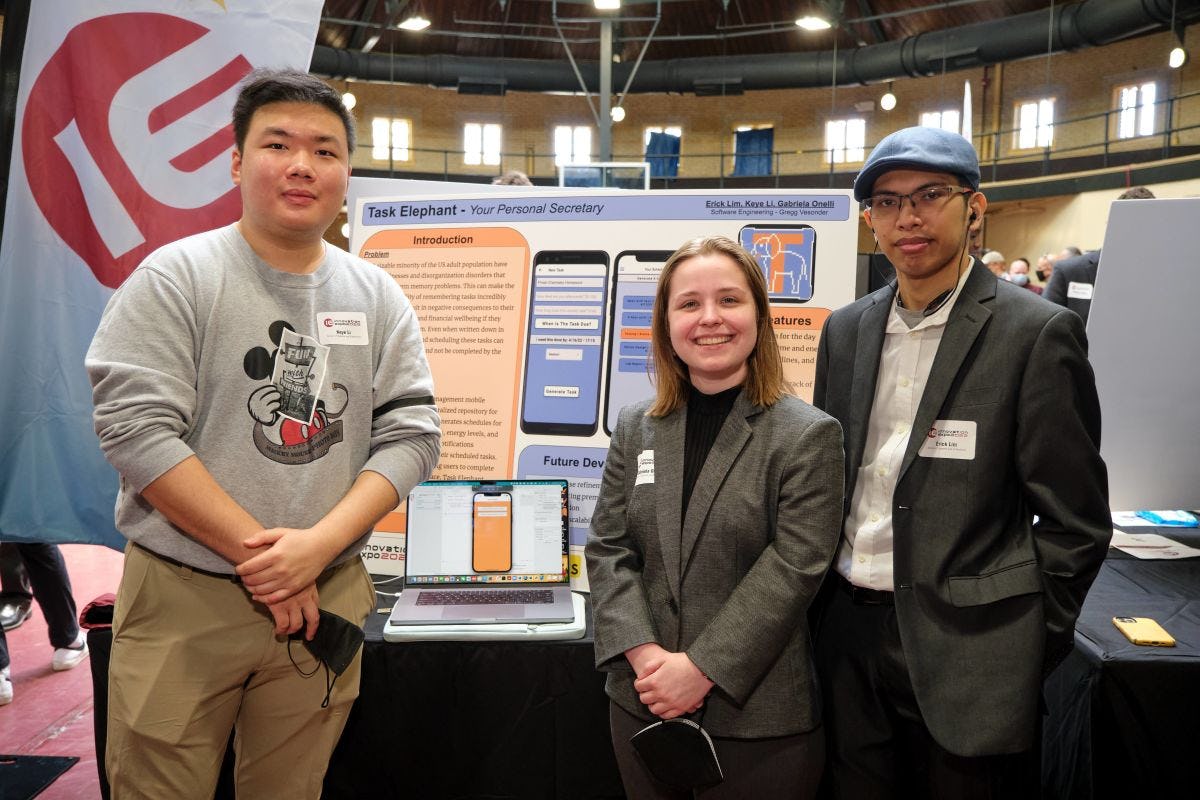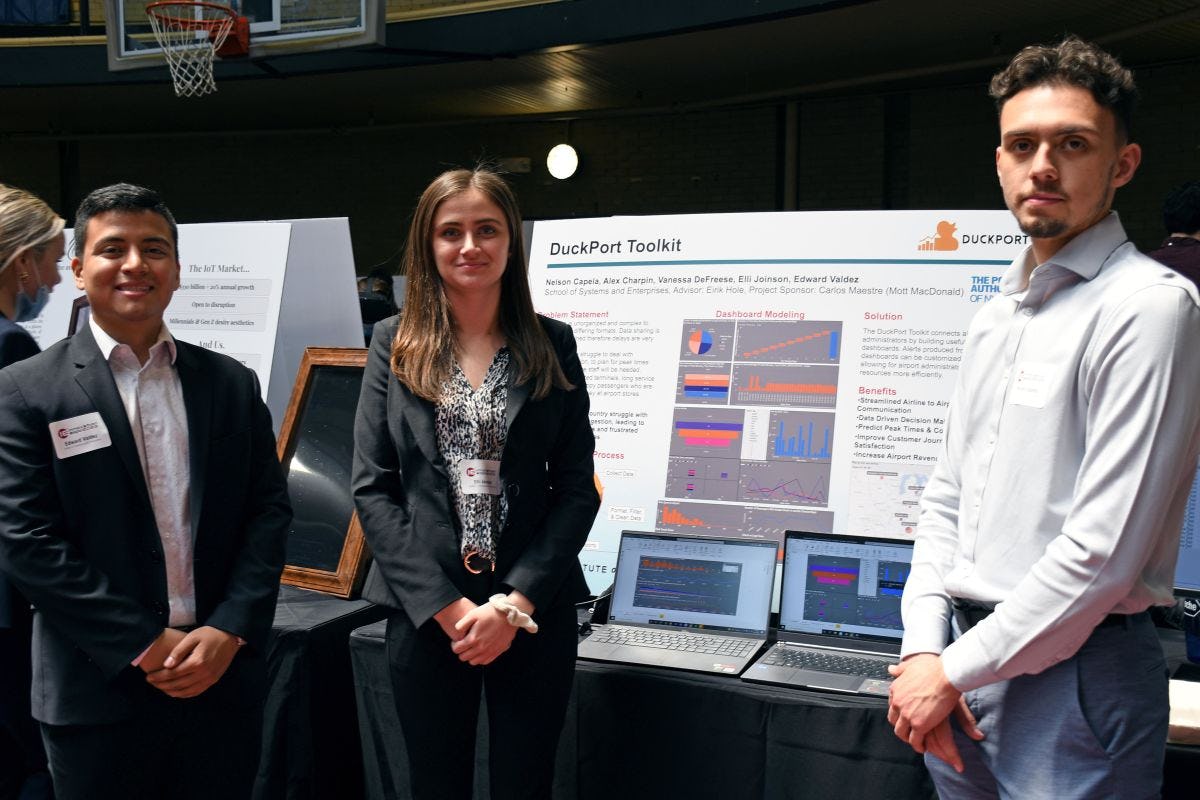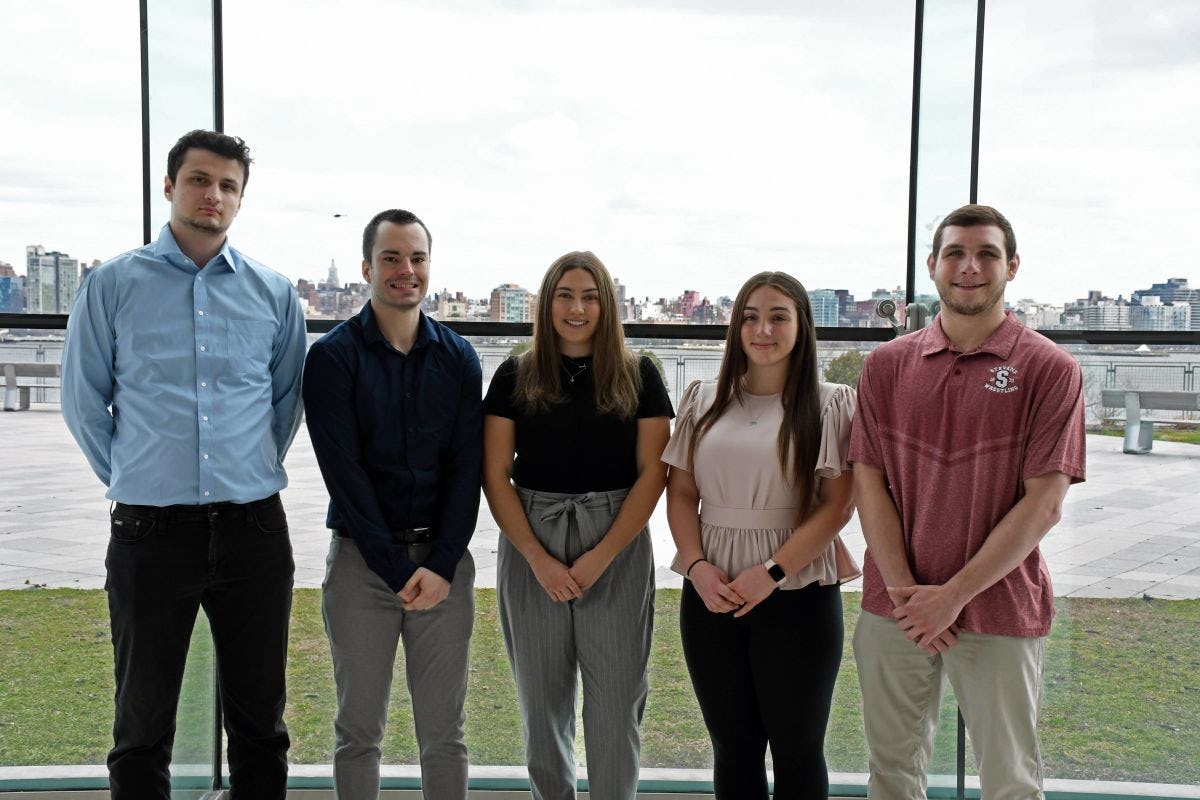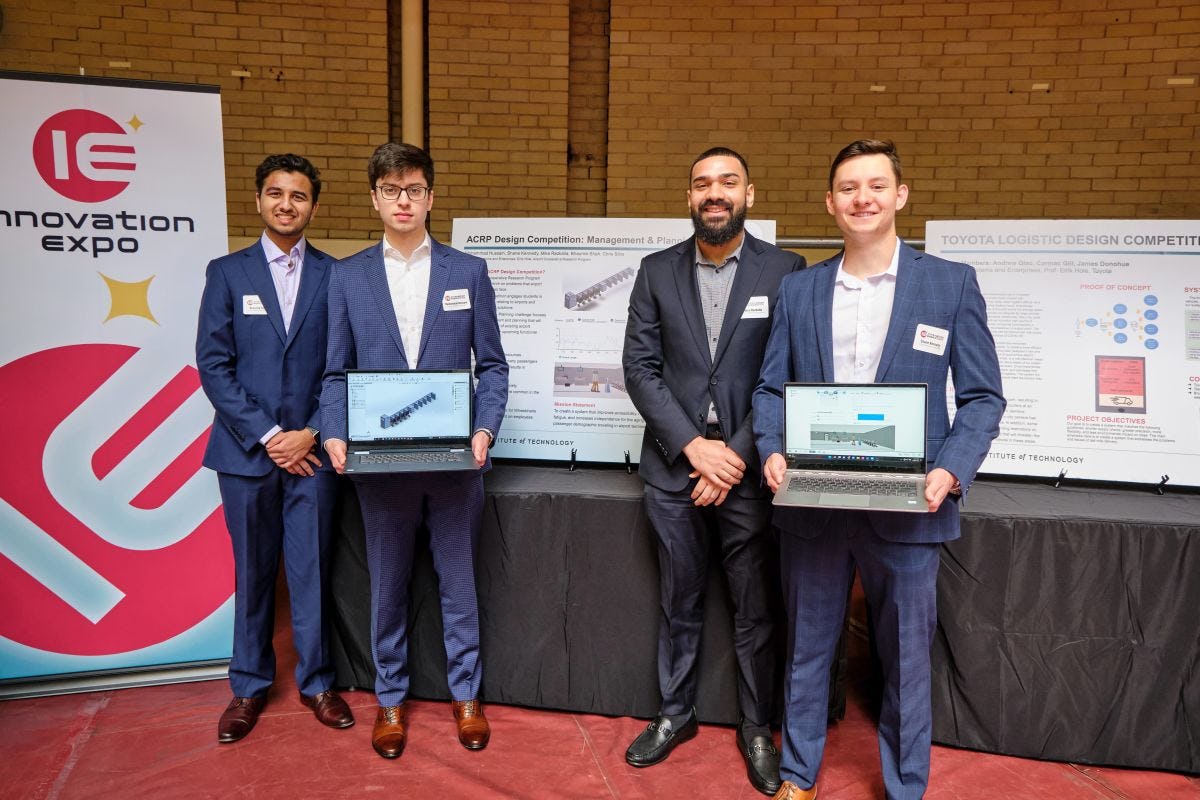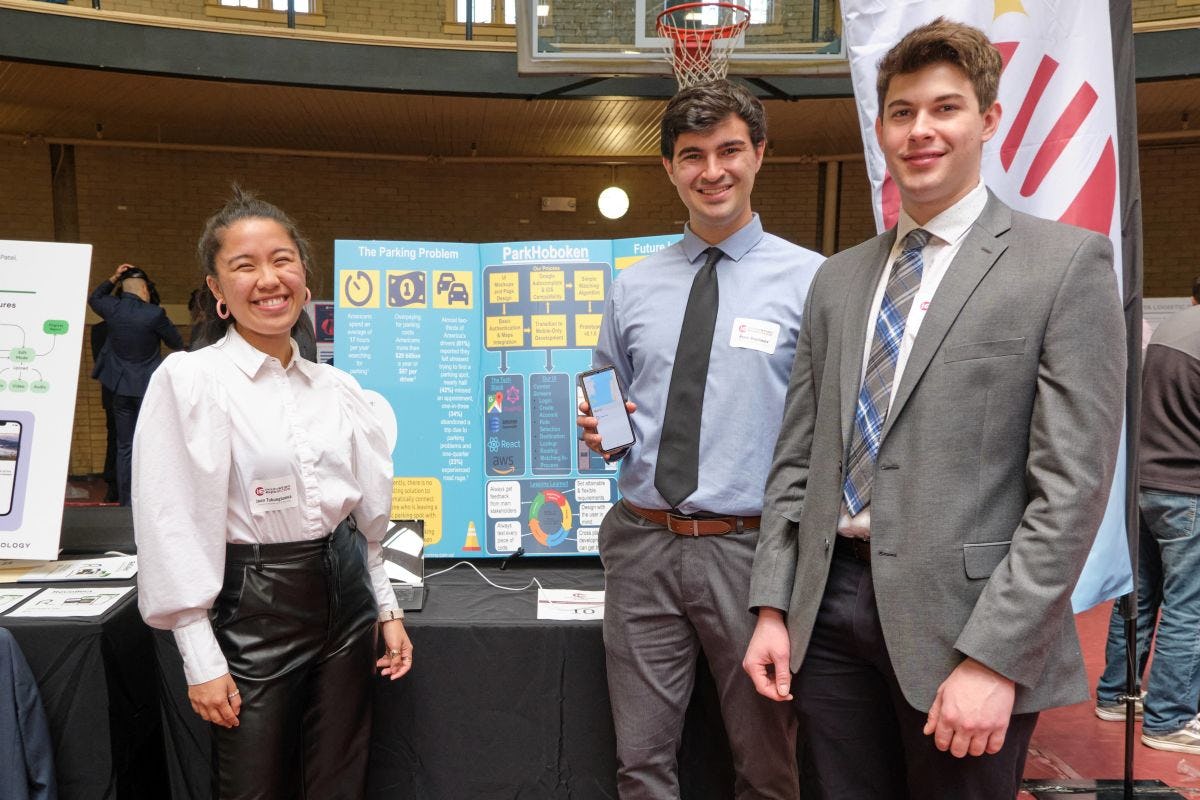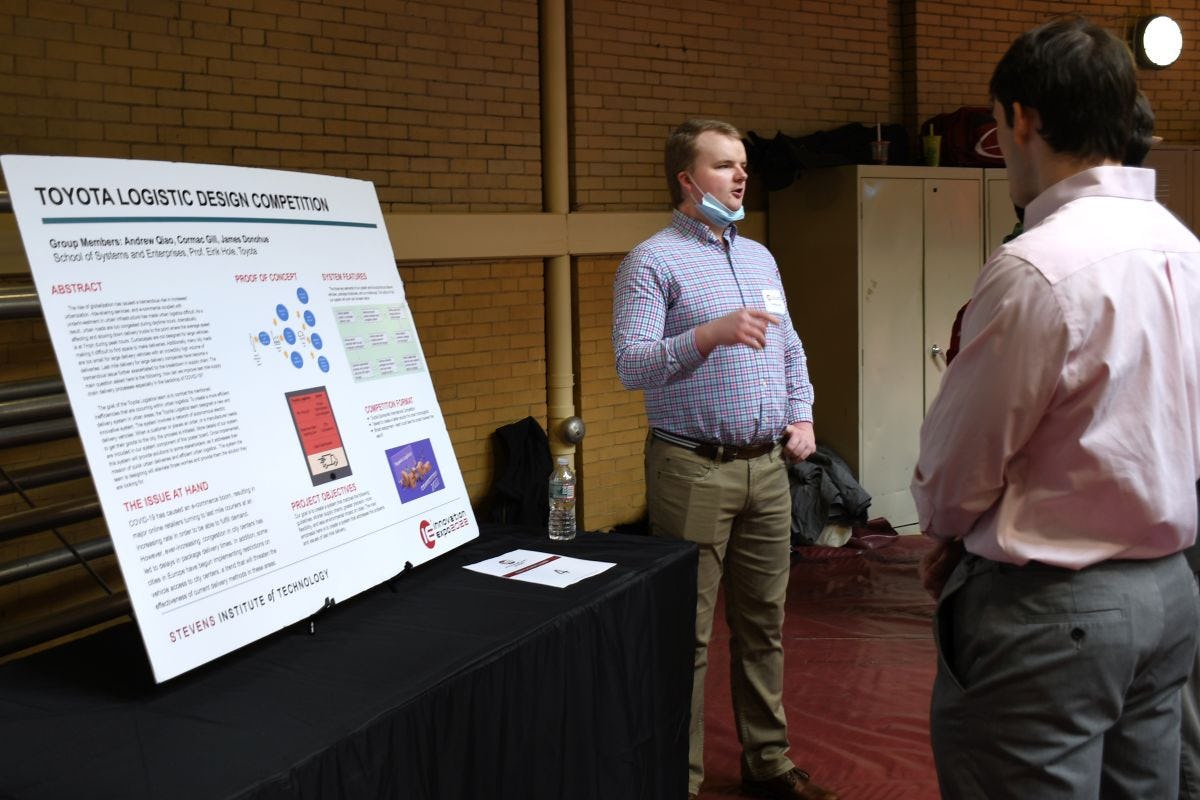Aviation, Cooking, Virtual Reality and More: 17 SSE Projects Shine at Innovation Expo 2022, Two Place Top 10 in Ansary Competition
Seniors from engineering management, software engineering and industrial and systems engineering showcase the broad and abundant application of skills learned at School of Systems & Enterprises.
On April 29, 17 student teams from the School of Systems and Enterprises (SSE) presented senior design projects at Stevens Institute of Technology’s Innovation Expo 2022, a record high number of participants for SSE. In the spirit of the school’s systems-based approach to complex issues, the senior capstone projects demonstrated innovative solutions to broad societal challenges in sectors ranging from transportation and accessibility to healthcare and food services.
“I am very proud of our hard-working students and their incredible diversity of research projects,” said Interim Dean Anthony Barrese. “Seventeen breaks the record for the most teams representing SSE, and it’s exciting to see the growth of the School and the application of systems-based problem solving.”
Two SSE design teams, Cookguide and VRScholar, additionally placed in the top ten of the Ansary Entrepreneurship Competition, a high-stakes contest to persuade prospective investors to help turn senior design projects into effective businesses.
Featuring inventive ventures such as a virtual reality skills instructor, an app that finds you a parking spot, a magic mirror and more, the SSE seniors displayed the entrepreneurial attitude and transdisciplinary knowledge needed to produce transformative change in society. Check out the projects below!
Educational Software and Assistants
From coffee sustainability to cryptocurrency and home assistants to VR headsets, SSE's seniors have created a diverse set of tools instructing on a variety of increasingly relevant subjects. Using software and systems-thinking, the relationship between technology and education is being revolutionized right here at Stevens.
Cookguide
Team: Veronika Myshkina, Steven Santiago and Kenneth Skelton
Advisor: Gregg Vesonder
Millions of Americans have trouble in the kitchen, lacking the time and resources to develop home cooking skills. Alternatives such as eating out, ordering in and frozen meals are not sustainable economically and health-wise.
Cookguide addresses this issue by providing a cooking assistant at your fingertips. A subscription-based app, the proposed software would remedy poor meal management by providing a database for discovering recipes and nutrition analytics, a calendar for scheduling meals and creating meal plans, a collection of meal preparation instructions and videos and a partnership with Amazon Fresh to supply ingredients.
GetRoasted!
Team: Whitney Dyer, Juliana Gaitan, Philip Jamison and Ava Ragonese
Advisor: Eirik Hole
Many coffee consumers and shops lack an understanding about where their coffee comes from and if the farming of that coffee is conducted ethically. Coffee workers need a seamless method to source beans in a sustainable way for producers and the environment.
Get Roasted! provides a “Linkedin for the coffee industry” mobile application that enables coffee professionals to develop quality relationships through connections and information sharing. Sustainability is incentivized as businesses with ethical and sustainable certifications will be highlighted. Additional features include an entry quiz to match shops with vendors, a curated news feed and direct links to vendors’ sites for placing orders.
Illusion
Team: Christian Kubelle, Brandon Llizo, JD Pablo, Max Perez and Thomas Ripp
Advisor: Gregg Vesonder
Today, companies such as Google and Amazon offer smart home assistants that all have one major problem – the appearance of the devices hinder any attempt at aesthetic cohesion with the rest of the room.
The Illusion Smart Mirror addresses this problem by merging the power of smart technology within the sleek, luxurious appearance of a mirror. At a glance, an Illusion user can see any of a multitude of personalized information modules, saving the user time that would be wasted interacting with and waiting for the response of current home assistant devices. Unlike other devices, the Illusion is useful even while turned off, as the device itself is built into a mirror.
Mynt
Team: Justin Kroeger, Joseph Letizia, Lauren Melendez and Markell Torres
Advisor: Gregg Vesonder
The world of cryptocurrency is evolving at an exponential rate, and new technologies emerge with it. However, this technology comes with complexity, confusion and cost. Current crypto platforms on the market require users to link external wallets to begin investing and have massive transaction fees that create a high barrier-to-entry for those new to NFTs.
Mynt looks to tackle the complexities of trading NFTs with a simple, easy-to-use UI where users can learn how to invest in NFTs without unnecessary complications or fees. Users are offered a free app to get comfortable investing into NFTs without risking their money. Mynt will feature two platforms, one that educates users on how crypto works and another that allows for live trading on the Ethereum blockchain.
VRScholar
Team: Spencer Drucker, Daniel Mako, Matthew Martin and Joseph Mirabile
Advisor: Gregg Vesonder
There are many basic life skills that students ages 13-18 are missing out on and are not being taught in school. Examples include daily needs such as cooking or skills that require unsafe conditions such as jumpstarting a car. Schools may lack the budget or ability to teach such practices.
VRScholar looks to remedy this by providing a virtual reality application that features a series of educational games simulating real life skills. Using a headset and controllers, the student is placed into a simulated environment to practice the skill and given detailed instructions on how to perform tasks.
Healthcare
How can technology improve the lives of those who suffer from mental health issues, memory loss and addiction? The students of SSE answer this question by building innovative tools to expand options for patients and healthcare professionals alike.
Oasis
Team: Kristin Kim, Andy Molla, Anjali Paliwal and Gavin Snyder
Advisor: Gregg Vesonder
Women who are victims of homelessness and domestic violence do not currently have adequate access to facilities and services largely due to information restraints. Many government websites and services are outdated or not maintained properly, meaning information on shelters is incorrect or not present at all.
Oasis is a resource designed to easily search for nearby shelters. Using Oasis's database, women using the app can find up to 80 shelters in their area. In addition to nearby shelters, Oasis also provides services to locate shelters based on specific amenities that they provide.
Opioid Tracking System
Team: Abigail Neel, Sanjana Chopra, AnaMaria Laccetti and Fiona Matthews
Advisors: Eirik Hole and Dr. Donald Lombardi
According to the Centers for Disease Control and Prevention, the total number of opioid prescriptions in the U.S. surpassed 142 million in 2020, and overdose deaths from opioids spiked from 56,064 in 2020 to 75,673 in 2021. Lax prescribing practices and the absence of education on prescription management lead to misuse and perpetuate the crisis.
To reduce these avoidable factors, the Opioid Tracking System provides a user interface that determines risk levels of the planned prescription, warns about unsafe prescribing and informs decision making. The system features an interactive opioid dosage calculator and prescription database both displaying patient information such as underlying conditions, dosages and prior opioid use. Doctors will be supplied with an organized decision support system and prescription guidelines.
Peer
Team: David Carpenter, Alexis Fuda, Andrew Jones, Julio Lora and Eleni Rotsides
Advisor: Gregg Vesonder
Millions of blind and visually impaired people in the United States do not currently have an easy way to determine whether or not a restaurant is accessible to them before arriving.
Peer is a restaurant review app for the visually impaired that reviews the accessibility of a restaurant. Think of Yelp, but for accessibility! The app details nearby restaurants and their overall accessibility ratings, an each rating is broken down to explain just what amenities and accommodations are available.
ReCollect
Team: Sylvia Boamah, Joshua Hector, Kushal Patel, Leena Domadia and Mathieu Nagle
Advisor: Gregg Vesonder
People with early stage dementia, alzheimer’s, or chronic traumatic encephalopathy deal with memory loss of past events and people, a lack of social engagement with family members, worsening conditions and strained relationships.
ReCollect provides a mobile/tablet application that creates digital scrapbooks from old photos, videos and audio. This collection of digitally preserved memories helps slow the progression of degenerative memory loss and uses reminiscence therapy to improve quality of life. The app also provides a report to monitor user’s progress.
Task Elephant: Your Personal Secretary
Team: Erick Lim, Keye Li and Gabriela Onelli
Advisor: Gregg Vesonder
A sizable population of adults in the U.S. suffer from mental illnesses and disorganization disorders that cause short term memory problems. This can make the daily responsibility of remembering tasks incredibly frustrating and result in negative consequences to their physical, emotional and financial wellbeing.
Task Elephant is a time management mobile application that provides a centralized repository for user tasks and events. The app generates schedules for users based on time commitments, energy levels and task priority and sends the user notifications throughout the day to complete their scheduled tasks. Task Elephant increases retention of tasks and reduces anxiety for its users.
Transportation
SSE takes flight with three projects improving how airports function, tackling issues in communication, congestion and accessibility. Back on the ground, autonomous technology proves to be key in making parking and deliveries more efficient.
DuckPort Toolkit
Team: Nelson Capela, Alex Charpin, Vanessa DeFreese, Elli Joinson and Edward Valdez
Advisor: Eirik Hole
Airports across the country struggle with flight delays and passenger congestion, leading to unhappy customers and frustrated employees. Currently, airline data is unorganized and complex to analyze due to differing formats and a lack of standardized information. This leads to congested terminals, long service lines, and agitated patrons who are less likely to spend money at airport stores.
The DuckPort Toolkit addresses this issue by building useful PowerBI dashboards to connect airlines to airport administrators. Alerts produced from the dashboards can be customized for each airport, allowing for airport administrators to use resources more efficiently. Benefits include streamlined airline to airport communication, data-driven decision making, predictable peak times, improved customer satisfaction and increased airport revenue.
FAA-1: Improving Aviation Communication
Team: Melik Ozolcer, Patrick Walther, Robbie Gennat, Aryana Muscara and Kila Eadie
Advisor: Eirik Hole
Pilot to air traffic control communication systems are currently congested with radio frequencies and suffer from subpar audio quality, language barriers and a slow exchange of information. According to the Federal Aviation Administration, 20-25% of all scheduled flights in the US experience delays.
This project aims to reduce the number of delays experienced by deploying a software system on on table devices for air traffic controllers to send instructions to the pilots. Air traffic controllers will be able to enter instructions by typing on a touchscreen keyboard or speaking into a microphone. Furthermore, they will be able to attach a media file as supplementary information such as maps, landmark images and weather data.
FAA-2: ACRP Design Competition
Team: Mohammad Hussain, Shane Kennedy, Mike Rezkalla, Bhaumik Shah and Chris Silos
Advisor: Eirik Hole
Team FAA-2 competed in the Management & Planning challenge from the Airport Cooperative Research Program, focusing on airfield management and planning to help optimize the use of existing airport resources. The team addressed accessibility in airports, seeking to improve insufficient experiences of elderly passengers who struggle to navigate through airports.
To create a system that boosts accessibility and independence while reducing fatigue and for the aging passenger demographic, the team created a system of improved airport infrastructure featuring a wheelchair sharing system, docking stations for electric wheelchairs and a guided navigation app for tablets.
ParkHoboken
Team: Evan Abel, Peter Damianov, Joan Tubungbanua and Sarah Wiessler
Advisor: Gregg Vesonder
Project Sponsors: Yeganeh Hayeri and Hojat Behrooz
According to a 2017 study from Inrix, Americans spend an average of 17 hours per year searching for parking, and overpaying for parking costs Americans more than $20 billion a year or $97 per driver.
Using a simple matching algorithm, ParkHobken looks to address this issue by systematically connecting a user who is leaving a public parking spot with someone who is searching for a parking spot within Hoboken.
Toyota Logistics
Team: Andrew Qiao, Cormac Gill and James Donohue
Advisor: Eirik Hole
COVID-19 has caused an e-commerce boom, resulting in major online retailers turning to last mile couriers at an increasing rate in order to be able to fulfill demand. However, ever-increasing congestion in city centers has led to delays in package delivery times.
To create a more efficient delivery system in urban areas, the Toyota Logistics team designed a system featuring a network of autonomous electric delivery vehicles, package drop boxes and a mobile app. When a customer places an order, an autonomous vehicle uses a navigation system to arrive an at address, deploy the package into a dropbox, alert the customer on the mobile app and then return to the facility for recharging.

